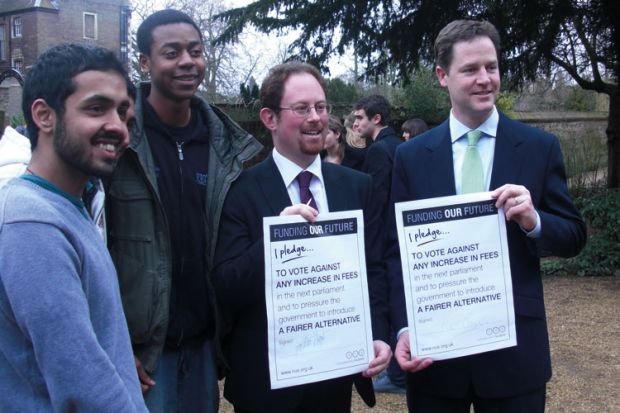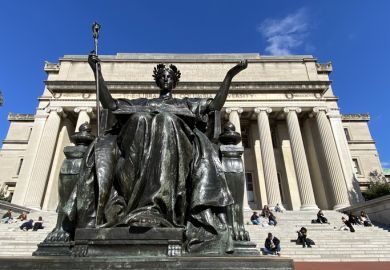Source: NUS
The promise: in 2010 Nick Clegg, along with Julian Huppert, pledged not to back any rise in tuition fees. Huppert voted against higher fees; Clegg voted for them
The photograph is infamous now. A youthful and carefree-looking Nick Clegg is holding up a pre-election National Union of Students pledge, bearing his signature, to “vote against any increase in fees in the next Parliament”.
The image is a bit like Oscar Wilde’s The Picture of Dorian Gray in reverse. The picture is the handsome political persona: the suddenly, miraculously popular Liberal Democrat leader of the “Cleggmania” of 2010. It is the real Mr Clegg who has undergone a dramatic political ageing process.
His smiling face in that picture will launch a thousand Labour election leaflets in 2015, producing what you might think will be a simple effect: students will desert the Lib Dems after their perceived betrayal, thereby delivering a number of crucial wins (in both Lib Dem and Conservative seats) to Labour.
But that is to gloss over several key questions relevant to the student vote: whether Labour needs to offer an alternative tuition fees policy to win student support; whether Lib Dems can hang on, based on their personal records, in constituencies with large numbers of student voters; what the impact of the switch to individual voter registration will be; and whether the electoral influence of the NUS has been curtailed by legislation passed this year known as the Lobbying Act.
A recent report by the Higher Education Policy Institute said that the student vote “could swing the result in just over 10 constituencies – principally to the advantage of the Labour Party. In a close fight, that could be enough to hold the keys to power.”
The Hepi report identified six Conservative seats that “might well” fall to Labour “because of the student vote”, along with four seats presently held by the Lib Dems: Manchester Withington, Norwich South, Bristol West, and Bermondsey and Old Southwark.
Target seats in Labour’s sights
Labour, which has launched an “Operation Student Vote”, is understood to have a list of 10 top student target seats that is almost identical to the Hepi list.
But confusion still surrounds Labour’s position on tuition fees. It has long been considering a policy of lowering the fees cap to £6,000 but there are suggestions that the party may shelve the policy because of concerns over how it would be funded. Stating a long-term commitment to a graduate tax is another option for the party that could either stand in for, or go alongside, a £6,000 policy.
Paul Blomfield, Labour MP for Sheffield Central, who describes his constituency as having “more students than any other MP”, sees the need for Labour to have a “clear policy offer” to students.
“While there is clear contempt for the Lib Dems over the broken pledge on fees, my concern is that all politicians have been damaged in the minds of young people,” said Mr Blomfield. “And therefore it is not enough to play on that [the broken pledge]. We need to offer a positive policy, and that is what we will be judged on.”
Toni Pearce, NUS president, said that her organisation’s polling showed that “Nick Clegg is kryptonite. Students don’t want to vote for his party after what he did.”
She added: “There is an emphasis on the Labour Party to give students and young people an alternative…Tuition fees have to be a huge part of that because the [current] system is failing. It’s not just failing students, it’s failing the taxpayer.”
But Nick Hillman, Hepi director and co-author of the student vote report, which analysed voting and polling data among students, said: “I don’t think it is necessary for Labour to offer a fully worked-up model for lower fees in order to win a big chunk of the student vote. For example, we don’t currently know what their policy is going to be, yet they are already far and away the most popular party among students.”
Another of Labour’s student targets is likely to be Cambridge (despite the party’s third-place finish there in 2010, just behind Tory candidate Mr Hillman). The sitting MP is the Lib Dems’ Julian Huppert – who signed the NUS pledge and voted against £9,000 fees.
Mr Huppert said that he had “stuck to my promise to students” and that he wanted in the long term to still be able to “find the money to scrap fees completely”. But in the meantime, he said, his priority “would be to help students when they are studying, and to help those most in need of assistance”.
He pointed to the introduction of scholarships and bursaries for undergraduates, as well as the recently announced postgraduate loans scheme.
“In contrast, Labour have floated the idea of cutting fees to £6,000 but failed to show any commitment to do so. While this might seem appealing, it does nothing to benefit the average student but would help those who go on to be high earners,” he argued.
Mr Huppert added that “people generally are becoming less interested in tribal party politics…I think people do increasingly care about the individual they will vote for, not just the colour of their rosette.”
The student sign-up challenge
This election will usher in a change in registration methods that is likely to have a great impact on students. Under the previous system, students in halls of residence were sometimes block-registered automatically. Hepi warns in its report that Individual Electoral Registration is a particular concern for students – a group not known for being the best organised.
Mr Blomfield described student voter registration as “an enormous issue”. He said that a pilot programme at the University of Sheffield – which offered students the chance to register to vote at the same time as they enrolled – has delivered “some of the best results in the country”.
But, according to Mr Blomfield, although 65 per cent of enrolling students said they wanted to register, only 24 per cent had completed the process by the close of enrolment this year. This, he said, was largely attributable to their difficulties in supplying a National Insurance number, which is required for the voter registration form. Mr Blomfield is confident that the university will increase the proportion of students who have registered by the time of the general election in May.
In terms of the NUS’ role, the Lobbying Act has placed limits on the campaign spending of trade unions and charities during election periods. Critics have called it the “gagging act” – and even suggested that it was driven specifically by Lib Dem fear of the NUS.
Ms Pearce said that while the NUS would be “constrained” by the act, it would still “campaign in the way we have always campaigned” – including taking pledge-breakers from the Lib Dems and other parties to task, which she said was “not a party political issue”.
“A huge part of our general election campaign will be to say that these are people who haven’t just let down students, they have let down the democratic system,” Ms Pearce continued.
In general, she warned against seeing student voters as a “single-issue demographic”.
Students care about “whether they are going to get a job, whether they are ever going to get on the housing ladder”, Ms Pearce said.
Register to continue
Why register?
- Registration is free and only takes a moment
- Once registered, you can read 3 articles a month
- Sign up for our newsletter
Subscribe
Or subscribe for unlimited access to:
- Unlimited access to news, views, insights & reviews
- Digital editions
- Digital access to THE’s university and college rankings analysis
Already registered or a current subscriber? Login





